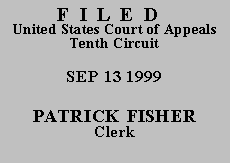

| WILLIAM JAY NICHOLS, |
|
| v. | |
| PATRICIA PRESLEY and NILES JACKSON, |
William Jay Nichols, a state prisoner at the Great Plains Correctional Center in Hinton, Oklahoma, appeals the dismissal of his civil rights action, brought pursuant to 42 U.S.C. § 1983, against the court clerk for the Oklahoma County District Court and a state court judge.(1)
In his action, Mr. Nichols claimed his constitutional rights were violated when the court clerk did not provide him with a trial transcript at public expense, and the state judge denied his request for a free transcript. The magistrate judge recommended that the complaint, barred by judicial immunity and quasi-judicial immunity, be dismissed for failure to state a claim. After consideration of Mr. Nichols' objections, the district court adopted the recommendation and dismissed the complaint. This appeal followed.
After fully considering Mr. Nichols' arguments on appeal and the entire file, we conclude that the magistrate judge and the district court correctly analyzed this case in their respective "Findings and Recommendation" filed August 21, 1998, and "Order of Dismissal" filed September 25, 1998, both of which we incorporate by this reference.
Furthermore, we find that this appeal is frivolous under 28 U.S.C. § 1915(e)(2)(B)(i) and, accordingly, dismiss this appeal pursuant to § 1915(e)(2). The district court dismissed the complaint pursuant to this same statutory provision; thus, that dismissal and our dismissal, together, count as two "prior occasions" for purposes of § 1915(g). See Jennings v. Natrona County Detention Center, 175 F.3d 775 (10th Cir. 1999).
DISMISSED.
ENTERED FOR THE COURT
Stephen H. Anderson
Circuit Judge
*.This order and judgment is not binding precedent, except under the doctrines of law of the case, res judicata, and collateral estoppel. The court generally disfavors the citation of orders and judgments; nevertheless, an order and judgment may be cited under the terms and conditions of 10th Cir. R. 36.3.
1.The court previously ordered the parties to address the jurisdictional issue of whether or not Mr. Nichols' appeal was timely. The state responded without addressing the "prisoner mailbox rule," see Houston v. Lack, 487 U.S. 266 (1988), and why that rule would not apply in this case as asserted by Mr. Nichols. We conclude that in the absence of any contrary showing by the state, Mr. Nichols has sufficiently established the applicability of the mailbox rule so that his notice of appeal may be considered timely filed.